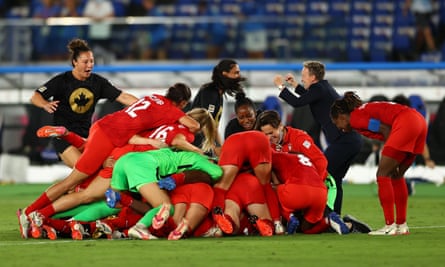How did a young Aitana develop a love for football? It was something that came naturally to her. She first started playing at school with the boys since there were no girls’ teams at the time. At the same time, she was also playing basketball. This love for football was ingrained in her and not influenced by her family, as they were not football enthusiasts. It was a desire she was born with.
At the age of 14, you joined the football club FC Barcelona. Can you tell me more about how that happened? Previously, I had been playing football on the school grounds and expressed interest in being part of Club Deportiu Ribes, my town’s local team. I spent about four to five years there before moving on to another team, Club de Futbol Cubelles. Throughout my time on these teams, I was the only female player. Because of a rule in Catalonia, players in the cadete age (14-15 years old) are not allowed to play on mixed-gender teams. This is when I had to stop playing with boys, and fortunately, Barcelona signed me at that point in my career.
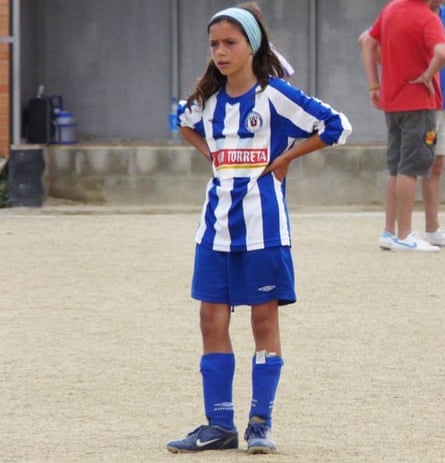
Can you describe your experience joining such a prestigious club at a young age? Playing for Barcelona has always been a goal of mine, but it seemed unattainable. I was completing my final year with Cubelles and knew that I would have to transition to playing with girls the next year. Then, out of the blue, I received a fax from Barcelona inviting me to try out.
The trials consisted of more than just exercises. It required fully immersing oneself in their designated age group and experiencing first-hand how they trained. I had the opportunity to participate in a friendly tournament with them. As someone who had only played with boys before, I was unfamiliar with playing with girls. It was a significant shift in my daily routine and also altered how I interacted with my teammates.
When I played with boys, there was always a sense of separation. They often didn’t acknowledge that a girl could be a skilled player, or even have a unique personality. The first few years at Barcelona were challenging as I transitioned to playing with girls, but it also brought more equality. We had all faced difficulties in our lives, particularly as girls, and even more so in the world of football. It was a significant change that I reflect on occasionally, as it was not a simple adjustment.
What was your ambition during that period? When I initially arrived in Barcelona, I didn’t have a clear end goal because it seemed unattainable. At that time, there weren’t any professional women’s football leagues, even at Barcelona. My plan was to stay for a couple of years and then possibly attend university and play in the United States. I even registered to take exams for American universities and had discussions with the University of Oregon. By that point, I had already been with Barcelona for four to five years and the team wasn’t making much progress. However, it was at that moment that I was invited to join the first team.
My mindset has always been a defining quality of mine. I have never skipped a training session or a game. This mentality has remained constant and I believe it is the driving force behind my success as a footballer. While talent and hard work are important, without the determination to push through sacrifice and challenges and constantly strive for improvement, I would not be the person I am today.
“Have you held onto any specific lessons from that time? I’ve come to understand the importance of resilience, perseverance, and consistent effort. It can lead you to your desired destination. The path may not always be easy, but it’s important to acknowledge that challenges are necessary for growth and improvement. Rather than giving up or becoming discouraged, view difficulties as opportunities for growth.”
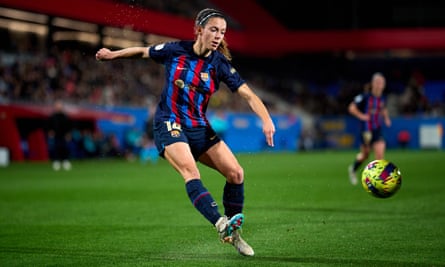
You experienced two pivotal shifts: moving from playing with boys to playing with girls, and then from girls’ to women’s football. How did you feel joining the first team? The initial year of playing with the first team was difficult for me. I had gone from being a key player, playing every minute during my time in the academy, to just being one of many on the team and not getting much playing time. This transformation from being a young girl to being surrounded by women, coupled with a new role that I wasn’t accustomed to, was challenging. I struggled with maintaining patience at times. My drive and constant desire for improvement were partly to blame. Overall, my experience playing for the first team in those first three years was not a positive one.
I was aware that I had the potential for more opportunities that were not being presented to me. Looking back now, I can see that I have made considerable growth and improved each year. The difficult moments I experienced have shaped me into the player I am today and were crucial to my development.
What goal did you establish for yourself after that? When I initially joined the first team, it was challenging to aim for winning the Champions League since the team was still in the early stages of growth and not yet at the top level in Europe. This objective became more attainable once we shifted our focus towards it later on. We dedicated ourselves to improving our physical abilities, which we believed was the crucial element that we lacked. As a result, we were able to put ourselves in a position to compete with the best teams.
In the beginning, my goal was to establish myself within the team and become a valuable player. I didn’t want to blend in with the rest. I often played on the sides and didn’t have a specific position. But I aimed to be a significant player in a position where I could excel. For me, that was always midfield. My determination was to prove my worth to the team every day and secure my spot.
When did you have a breakthrough moment where you felt your role in the team was clear? The moment I truly felt like I had made significant progress and was appreciated for my contributions to the team was when we won the Champions League in Gothenburg in 2021. While I had played a lot and started often in the previous year, my role as a starter was not fully solidified yet. I believe since then, I have consistently performed at a high level. It took eight years to get to this point.
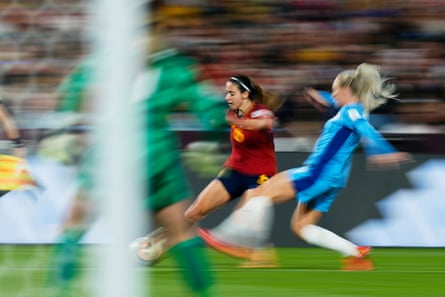
Display the image in full screen mode.
What comes to mind when you think about the effort you have put into your career? I believe that I have not received any handouts to reach where I am today. A lot of hard work and determination has been put behind it. I can still recall the times when I would travel back home from training with my father using public transportation, sometimes not getting home until 1am. We had to rush out of training in order to catch the train. I didn’t even have time to shower at the training grounds. There were difficult years, but the resilience that I have mentioned has ultimately paid off. As I reflect on my accomplishments, I am certain that it was not just luck, but rather the result of years of hard work.
“Please disregard any upcoming newsletter promotions.”
after newsletter promotion
You have achieved nearly every possible accomplishment, including a World Cup, Champions League, league title, and cup. What comes next? While I have accomplished a great deal at 26, I still have a strong desire for more success. As long as I maintain that hunger and ambition, I will continue to play professional football. I am motivated to compete and train at the highest level on a daily basis. Additionally, I have yet to win a European Championship or an Olympic medal, so there are still more goals to strive for.
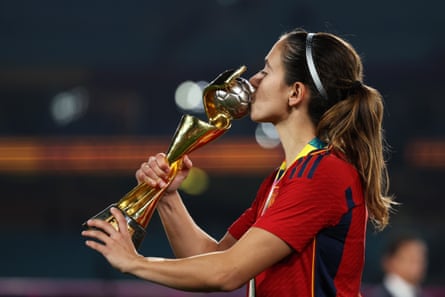
View the image in full screen mode.
What has been your experience before and after the World Cup? The success of the World Cup is not solely to credit. It has been a fantastic year for both my club and national team, impacting society by reaching more households. Naturally, winning brings recognition on a national and international scale. All of this contributes to success.
I consistently acknowledge the contributions of all team members. Together, we had a successful year in all the teams I belong to, leading to my nominations and awards. This has marked a significant transformation in my reputation. However, I remain true to myself and continue to live my life as I always have.
How does it feel to be recognized and appreciated for your skills to play football? Knowing that people value and respect your accomplishments is very satisfying. It’s an honor to be an idol for many. That’s why I try to not only excel on the field, but also to be recognized for my off-field actions. It’s important to me. When someone idolizes a player, it’s not just about their performance on the field, but also their character as a whole. It’s truly gratifying and something I strive to maintain. In the end, when my career is over, the awards and titles I’ve won will be great, but knowing I’ve brought joy to many is the most rewarding aspect for me.
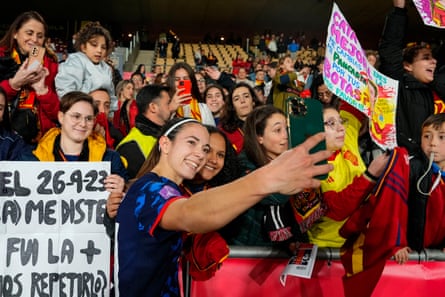
Display the image in full screen mode.
How has it been for you to play a crucial role in the evolution of Spanish football? I feel fortunate to have witnessed the growth of women’s football in recent years. While we have come a long way, I don’t believe we have reached the end goal yet as there is still much room for improvement. However, in a relatively short period of time, our circumstances and resources have greatly improved.
Is it true that winning improves your circumstances? I want to acknowledge Barcelona for being an exceptional club and a trailblazer, as they have shown immense support and faith in our journey to becoming professional football players. Their provision of resources has allowed us to excel under optimal conditions, which was once considered unimaginable.
How do you hope to be remembered when you retire from your career? My hope is to be remembered as an outstanding soccer player who inspired many others. I also want to be known for my actions outside of the game. Maintaining a balance between my personal and professional life is important to me. I prioritize connecting with fans and being accessible to them because I believe they are a huge part of our success. Without them, we wouldn’t have the opportunity to play in iconic stadiums like Camp Nou. Ultimately, I want to be remembered for not only my abilities on the field, but also for using my platform to enact positive change and bring visibility to women’s football.
Source: theguardian.com











